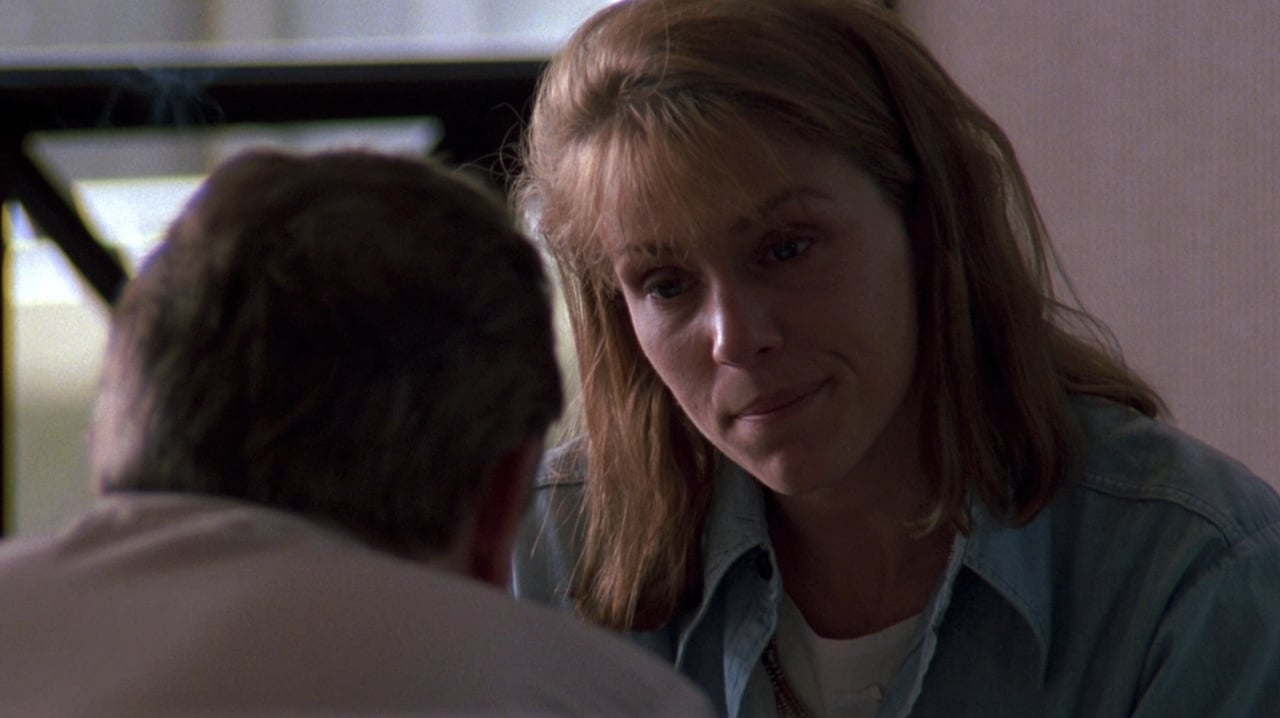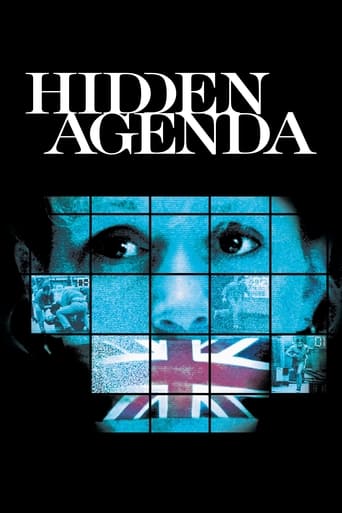mraculeated
The biggest problem with this movie is it’s a little better than you think it might be, which somehow makes it worse. As in, it takes itself a bit too seriously, which makes most of the movie feel kind of dull.
Joanna Mccarty
Amazing worth wacthing. So good. Biased but well made with many good points.
Taha Avalos
The best films of this genre always show a path and provide a takeaway for being a better person.
Skyler
Great movie. Not sure what people expected but I found it highly entertaining.
lasttimeisaw
Ken Loach's controversial Cannes entry in 1990, which won him the Jury Prize, HIDDEN AGENDA is a faction political thriller sets in a powder keg Belfast during the Northern Ireland Troubles. An American civil rights lawyer Paul Sullivan (Dourif) is crassly murdered along with a Provisional IRA sympathizer by British security force en route to a covert meeting with his secret source, a mysterious Captain Harris (Roëves). Paul's aggrieved girlfriend and colleague, Ingrid Jessner (McDormand), remains in Belfast to seek out the truth, and soon is assisted by the righteous police detective Peter Kerrigan (Cox), designated by the Great Britain to lead the investigation. Congruent with Loach's rigid, anti-sensational stock-in-trade, HIDDEN AGENDA is, paraphrasing its closing quote from James Miller, a former MI5 agent, "like the layers of an onion, the more you peel them away, the more you feel like crying", a somber police procedural strenuously resorting in verbal sparring to piece together the jigsaw of a conspiracy theory which implicates some insidious maneuvers from UK's Conservative party with regard to Margaret Thatcher's rise to power, then poignantly shades into a hammer blow to those who uphold an idealist view on political subterfuges. At least for once, it is not the usual suspects of IRA who are in the receiving end of the diatribe, but the whole rotten democratic polity of the Great Britain, iniquity operated by the powers that be and they are not ashamed, because they cannot be touched. In Loach's all-fired persistence, the reveal (not so shocking to those who are world-weary or cynical), resounds with a cauldron of self-defeat, angst, exasperation and disillusionment. As a pacy thriller, Loach circumspectly orchestrates a fringe approach to downplay all the suspense usually default in the genre (no bombastic car-chasing, fistfight or firefight). The truth- seeking process is intriguingly hard-hitting and hardly impeded by any red herrings or devious plotting (a secret tape is the McGuffin), the resistance is brazenly from the bureaucratic backscratching among top brass by way of face-to-face hectoring (a bumptious Jim Norton is a standout among the squadron of supporting players as the head of the constabulary Mr. Brodie) and Brian Cox is redoubtable as a stout rock refusing to budge from mounting pressure, which makes his powerlessness and concession all the more telling in the coda. Yet, in a pivotal scene with Harris, one can manifestly sense his contempt for the latter, whom he summarily deems as a traitor seeking refuge from IRA, no one can conduct disinterestedly where hardened bias and congenital patriotism can penetrate through one's head as easy as falling off a log. Kerrigan's astute ambiguity is refracted by Frances McDormand's impassioned performance as Ingrid, who is at once ingenuous and intrepid, and doesn't succumb the disheartening reality check solely because she is an outsider, she has nothing else to lose in the purgatory besides her own life, but the film comes to a halt when Kerrigan retreats back from his mission, Loach doesn't want a feel-good deus ex-machina to sabotage his scrutinizing endeavor (otherwise, in a lesser hand, it would be very possible to deploy a secret-recording from Kerrigan of his confab with two high-rank accomplices to turn the table in the eleventh hour), because he doesn't need his films to please everyone, HIDDEN AGENDA is a provocation, but an intelligent one, Mr. Loach masterfully forces us to face a most inconvenient truth with his highly matter-of-fact modality, and its repercussions are here to stay.
Chris Lawson
Whooaa! Slow down, sol1218 from Brooklyn NY.The political scene in the U.K. looked like this: Edward Heath, bachelor leader of the Conservatives, won the election in 1970. He took Britain into the then Common Market in 1973, but called an election in February 1974 when the miners forced him to declare a three-day week.The Tory slogan for the election was: Who governs Britain? The result was confused, but the message was fairly clear: Not you, matey. Labour under Harold Wilson took office with a slim majority. Wilson called a second election in October, which he won narrowly, increasing his majority slightly.He held a referendum on the Common Market in 1975, which he won by sidelining the extremists of both Left and Right. He ruled until 1976 when he resigned from politics, for reasons which were obscure at the time, but probably because he had been diagnosed with Parkinson's. It is certainly true that the Right plotted endlessly against him.Jim Callaghan, who had been Chancellor, Home Secretary and Foreign Secretary, took over as P.M. and called an election after his full five-year term. (In the U.K. governments normally call elections after four years.) In fact Callaghan was forced to do so because of a move by the Scottish Nationalists. Had he called the election just a year earlier, he stood a good chance of winning, say many pundits.Meanwhile, the Conservatives had deposed Edward Heath who had lost them two elections, and Maggie Thatcher replaced him as leader. She swept to power in 1979, and as we all know, won the next two elections.Economic chaos was the watchword of the day and there were many strikes. The situation in Northern Ireland, which had started simmering with the Civil Rights movement of 1968, gradually deteriorated. The assassinated politician of the film whose name is Nevin, may well represent Airey Neave, a war hero who had escaped from the high-security Colditz Castle, a German-speaking lawyer who had attended the Nuremberg Trials and a hardline Conservative with military and security connections, who was a close adviser of Thatcher. He was blown up outside the House of Commons on March 30, 1979, by the INLA a few weeks before the election.Ken Loach has never made any secret of his sympathies for the Irish cause. His powerful film "Wind that shakes the barley", which apparently did not make much money in the U.K., had Conservative politicians fulminating about treason and lack of patriotism because of his portrayal of the brutal Black and Tans. The name was given to the ex-British army personnel and (inaccurately) also to the auxiliaries who were sent to Ireland between 1920 and 1921 to crush the IRA and Sinn Fein, but who also attacked and killed civilians. Historians agree, however, that Loach was pretty accurate in his historical recreation. The film also shows the ruthlessness of Irish-on-Irish killings in the Civil War afterwards.
RanchoTuVu
When a police investigator is called in to determine the facts behind the murder/execution of an American civil rights lawyer in Northern Ireland, he discovers not only an extensive cover-up of that event, but also a giant political conspiracy as well. Set in Northern Ireland, the film is a critical look at the response by the British government and military to the IRA. Not only is the response brutal and deadly, the so-called threat the IRA poses to order and stability is capitalized on by Tory political masterminds in Margaret Thatcher's administration, as well as the CIA, in a devious attempt to permanently keep the progressive Labor opposition from ever taking power again. Directed by Ken Loach, the film has a noticeable political angle, though he holds a steady hand on the action and the investigation, with sharply written and acted interrogation scenes and meetings with reclusive IRA people, as well as bringing in the political elites, to make it fast moving and constantly interesting.
George Parker
"Hidden Agenda" - another in a long list of films about the conflict in Northern Ireland - focuses on the investigation by British detective Kerrigan (Cox) of the assassination of an American civil liberties investigator. The film gets down to business quickly as it shows the pervasive and deeply rooted divisive sentiments of Ireland with a straight forward, no frills approach and a whodunnit type plot. A well made location shoot with no frills, "HA" will most likely be appreciated by those with some understanding of the Irish conflict.

